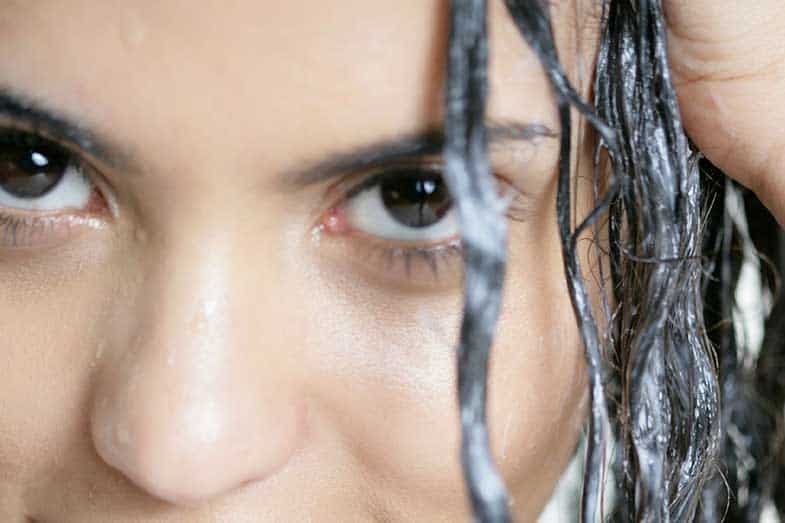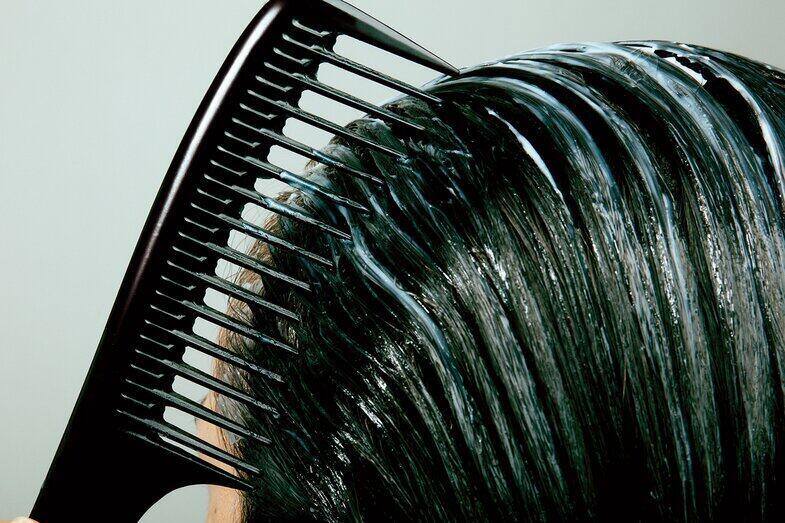Most people who use conditioner apply it and rinse it out in the shower. But what if you don’t rinse it out and just leave it in your hair? Can you leave conditioner in your hair?
You can leave conditioner in your hair if you are using a specific type of conditioner called a “leave-in” conditioner. However, most conditioners are “rinse-out” conditioners, and they need to be rinsed out, not left in the hair.
Most standard conditioners are the rinse-out type and should be rinsed out thoroughly after applying to the hair. Typically, rinse-out hair conditioners are thicker and more concentrated because they have to act quickly on the hair before being rinsed out. If you don’t rinse out a rinse-out type conditioner, it will feel heavy and damage your hair and scalp.
Leave-in conditioners are a special type of conditioner that you can safely leave in your hair without rinsing, even overnight if you want. Leave-in conditioners are thinner and contain safe hair moisturizers such as glycerin. If your hair is curly, frizzy, thick, or damaged, you would benefit from using a leave-in conditioner.
Read on to learn more about conditioners and whether you can leave them on your hair or not.
Can You Leave Conditioner in Your Hair?
You can leave conditioner in your hair if you are using a specific type of conditioner called a “leave-in” conditioner. However, most conditioners are “rinse-out” conditioners, and they need to be rinsed out, not left in the hair.
Before describing the different types of hair conditioners, including leave-in conditioners, let’s look at what exactly is hair conditioner.
What Is Hair Conditioner?
Hair conditioner is designed to improve the appearance, feel, and manageability of hair. It reduces friction between strands of hair to allow smoother combing or brushing.
The standard components of hair conditioner are oils, soaps, emollients, and silicones. The oils ensure that hair is smooth, easy to comb, and not dry but healthy.
The soaps help dissolve stubborn dirty oil, fat, and similar substances. Water alone cannot do this. The silicones ensure that hair is lustrous, has no split ends, while emollients and oils keep the hair shiny, firm, and well-nourished.
Some of its primary ingredients are:
Acidity regulator – this regulates the pH of your hair, which should be at pH 3.5. The pH (acidity and alkalinity) of hair has to be acidic so that it is straightened and lighter.
Moisturizers – moisturizers, such as natural oils and humectants, provide moisture to hair to maintain its smoothness and vibrancy.
Surfactants – surfactants, such as Cetrimonium Chloride and Behentrimonium Chloride, act on your hair by attaching themselves to the surface of the negatively charged amino acids present on the keratin’s surface. This process will bind the surfactants’ hydrophobic (water-fearing) end to the hair surface and their hydrophilic (water-loving) area to the keratin. The hair is, thereby, protected by the hydrophobic coating of the surfactant.
Oils – oils are made of essential fatty acids that help dry hair become smoother and softer; thus, more comfortable to comb and manage.
Sunscreens – sunscreens prevent sun damage by providing a protective cover on the hair’s surface. Examples are Ethylhexyl Methoxycinnamate and Benzophenone-4. These substances are different from skin sunscreens because they are lighter and have a different texture.
Some manufacturers add more ingredients for different purposes. You have to read the conditioner’s label to find out its contents.
Types of Hair Conditioners
1. Rinse-out Conditioners
These are conditioners that you should rinse after applying for one to two minutes. They make hair smooth and protect it from damage or split ends. Some manufacturers claim that they also maintain healthy hair and scalp. This product is the most common type of hair conditioner.
2. Leave-in Conditioners
These conditioners are thinner and less dense. They moisturize the hair and protect each strand with a light coat of oil or surfactant. You can spray it on your hair after a shower and leave it on to make your hair easier to comb.
They are intended for frizzy, kinky, or naturally curly hair.
Why Is My Hair Curly Underneath but Straight on Top?
3. Dry, Pack, or Deep Conditioners
These conditioners repair dry and damaged hair through emulsifiers and oils. They contain more ingredients to treat hair dryness. You can apply the conditioner and leave it for 30 minutes and then wash it thoroughly. This characteristic will provide a deep oil treatment for your hair, so it remains smooth and soft.
They are rich in cationic surfactants that tend to let the hair stay together. They are more viscous and are made of aliphatic fatty acid chains, forming thicker layers on the hair’s surface.
4. Cleansing Conditioners
You can use cleansing conditioners as a pre-treatment before you shampoo your hair. This conditioner is designated most, especially for extraordinarily curly and damaged hair. The ingredients are cationic and amphoteric surfactants, having the ability to react with ions of opposite charges.
5. Hold Conditioners
You can hold your hair in the desired shape by using these types of conditioners. They function like hair gels due to their cationic polyelectrolyte polymers. These components are similar to the ingredients of hair gel.
Benefits of Hair Conditioners
Hair conditioners have these benefits:
- Smoothens strands of hair for easy combing
- Prevents and reduces split ends
- Makes the hair appear fuller and lustrous
- Prevents drying out of hair
- Promotes healthy hair growth
- Nourishes hair
- Moisturizes the hair
- Strengthens hair by providing a protective coating
- Allows hair to grow healthily

How Long Can You Leave Conditioner in Your Hair?
Hair conditioners work by coating each hair strand with emollients or oil to make it smoother and more comfortable to comb. The conditioner’s soap component will help remove lousy grease, grime, and dirt from your hair. The surfactants help the hair to thrive without split ends and prevent hair damage.
How long can you leave conditioner in your hair? The amount of time you can leave conditioner in your hair depends on the type of hair conditioner that you use. If you’re using the rinse-out conditioner, you can leave it on your hair for one to two minutes.
In the leave-in conditioner case, you can apply it after washing your hair and leave it until your next shower.
For the dry conditioner, you can use it longer before washing it off. This time can be from five to ten minutes.
How Often Should You Use Hair Conditioners?
It would be best if you used a conditioner whenever you wash your hair. This usage will ensure that your hair remains lustrous and smooth. However, you have to use the correct shampoo for your type of hair.
If your hair is dry, use the dry or leave-in conditioner; if it’s oily, use the rinse-out product, and if it’s normal hair, you can use either the rinse-out or leave-in conditioner.
The use of conditioners would ensure that your hair stays manageable and healthy.
What Happens If You Leave the ‘Rinse-out’ Conditioner In Your Hair?
When you use this type of conditioner, you should rinse your hair. Leaving it on your hair would not have an additional benefit to your hair. Instead, it could clog your skin pores that can lead to unhealthy hair and skin. So, you have to rinse it out thoroughly.
Take note that leaving the rinse-out conditioner longer than necessary does not do any good but only leads to product buildup that can ruin your hair instead.
Some people develop an urticarial reaction (skin allergy) to conditioners containing amino acids and proteins. So, if you leave these conditioners on your hair, you increase the risk of this happening.
Disadvantages of Using Hair Conditioners
Some people can have negative reactions to conditioners. If you leave conditioner in your hair, or even if you use conditioner and rinse it out right away, consider the possible disadvantages.
Allergy
There are rare instances when a person has an allergy to the conditioner’s ingredients. This side effect can prove fatal. So, when allergy symptoms, such as itching and skin rashes occur, the person should stop using the product and visit the nearest health facility.
If the reaction is not severe, the symptoms can go away upon the stoppage. But if the allergic reactions are severe, you should immediately take the person to a hospital or clinic.
Acne Due to Improper Rinsing
When you don’t correctly rinse out conditioners, they tend to fall on your face and could clog skin pores leading to acne. Conditioners contain oils that can clog your skin pores. Hence, be careful not to allow conditioners to stay unwashed from your face.
Heavy Hair
Deep conditioners can weigh down people with thick hair strands. This effect occurs when the person has oily and thick hair. The conditioner contains oils, so if the hair is already oily, it will worsen the condition.
Silicone Compounded Effect
The use of silicone-rich conditioners can be counterproductive if you don’t rinse them off adequately. This substance’s buildup may damage your hair instead of when it’s combined with the shampoo’s ingredients. Make sure that your shampoo and conditioner can work together to maintain your hair’s health.
In this aspect, it’s best to buy a pair of hair care products from the same company because manufacturers made them in sync with each other.

We’ve answered the question: “Can you leave conditioner in your hair without rinsing?”; and “Can you leave conditioner in your hair overnight”? Next, let’s look at tips for using conditioner properly.
Tips for Using Hair Conditioners Properly
- Before applying the rinse-out hair conditioner, you have to remove excess water so the conditioner can cling to the hair strands firmly. For the leave-in conditioner, use it to toweled-dry hair right after shampooing and washing it.
- Please take note of the ingredients of your conditioner before using it. You might be allergic to any of its components. As much as possible, avoid silicones – if you don’t want to shampoo – as they can build up in your scalp when you don’t wash them off properly.
- Avoid applying conditioner on your scalp unless the label explicitly stated it’s for dandruff or is safe for your scalp. Apply it at your hair’s ends and rub gently to allow it to coat the hair strands.
- Shampoo your hair adequately before conditioning it. The primary purpose of your shampoo is to get rid of dirt and grime from your hair. You should apply the conditioner only to clean or shampooed hair. When you don’t shampoo your hair, the conditioner’s ingredients could build up in your scalp or hair strands, causing untoward reactions or effects, as previously mentioned.
How to Maintain Healthy Hair
Maintaining healthy hair doesn’t only involve using hair conditioners. You should also know how to maintain good health. If your body is healthy, this will make your hair healthy.
Eat Right
Healthy hair needs a healthy diet. The hair is composed of proteins, such as keratin and the hair pigment melanin. Examples of food that promotes healthy hair are vegetables and fruits.
Green leafy vegetables, spinach, and potatoes are best because they contain anti-toxins and essential nutrients and vitamins that promote hair growth and development. Potatoes provide vitamin A needed for the proper growth of hair.
Exercise
You have to exercise regularly, as well. Through exercise, you can eliminate excess oils or fats from your body, including those in your skin pores and hair follicles. Exercise can also rejuvenate your immune system, allowing your hair follicles to stay healthy and produce healthy hair.
Hydrate
When you hydrate yourself adequately, your hair cells will function properly. So, even if you accidentally leave your hair conditioner, your hair cells can get rid of it efficiently.
Avoid Stress
Stress can cause disturbances in your hair growth. A research study conducted on stress and hair growth showed that hair growth during prolonged stress exposure hampers hair growth. Stress can also affect sleep, and sleep is vital to hair growth because, during sleep, most body cells regenerate.
Is Dove Shampoo Good for Your Hair? [Dove Review]
Is L’Oreal Shampoo Good for Hair?
Conclusion – Can You Leave Conditioner in Your Hair?
So to recap, can you leave conditioner in your hair? Whether you should leave conditioner in your hair or not depends on your type of hair and the type of conditioner you use.
If the conditioner is a rinse-out type, you should rinse it out. For the leave-in conditioner you can leave it on your hair longer, without rinsing it out. This conditioner is suitable for curly, frizzy, thick, and damaged hair.
Before using the conditioner, you should always read the ingredients, instructions, and what hair type it is suitable for. The damage to your hair can be avoided if you choose a conditioner ideal for your type of hair.
Related reading:
How Long to Leave Henna on Hair?
How Long to Leave Dye in Hair for Best Results?




